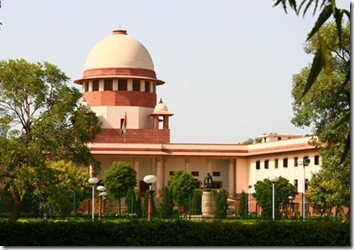
The Supreme Court (SC) on Thursday admitted two petitions that challenge the prevalence of the advocate-on-record (AOR) designation in the SC, a year after the High Court (HC) of Delhi dismissed the challenge.
The Supreme Court Advocates Association’s (SCAA) appeal against the Delhi HC’s 13 February 2012 decision upholding the AOR system in India, and a writ petition filed by five SCAA members challenging the Supreme Court Rules 1966 (SC Rules), were clubbed together by a bench headed by chief justice of India (CJI) Altamas Kabir.
The SC Rules in order 4, ban advocates other than AORs from acting, appearing and pleading before the SC.
However, advocate Balraj Malik contended before the HC in 2011 that order 4 was in conflict with Section 30 of the Advocates Act 1961.
Section 30 was enacted under Part 4 of the Act on 9 June 2011, entitling all advocates enrolled in India to practice before all Indian courts, including the SC, subject to other provisions of the Advocates Act 1961.
However the HC had held that Section 30 was to be read with Rule 52 of the SC Rules, which preserves the rule-making power of the SC under Article 145 of the Constitution. The SC was therefore empowered to decide the manner as well as the right to practice of various classes of advocates before it, said the HC.
Advocate Arun Kumar, who is one of the present writ petitioners, told Legally India that the HC had not dealt with their contention that Order 4 of the SC Rules was effective only due to a “transitory provision” - Section 58(3) of the Advocates Act.
Section 58(3) provides that advocates were subject to the SC Rules, in respect of their right to practice in the SC, only until Part 4 of the Act was enacted.
Therefore, according to the SCAA’s appeal, the SC Rules are now, after enactment of Part 4, subject to Section 30 and not vice versa.
The SCAA members have by way of their writ also challenged the validity of Rule 52 as being in violation of their fundamental right to practice a profession under Article 19 of the Constitution.
The SCAA relied on Section 16 of the Advocates Act which does not explicitly mention any AOR-equivalent designation, but only classifies lawyers into “advocates” and “senior advocates”. Therefore, the SCAA contends that the SC cannot make a third classification in breach of the Act itself.
Senior advocates Ram Jethmalani and Dinesh Dwivedi argued for the petitioners on 20 February when Kabir directed the ministry of law and justice, the Supreme Court registrar, and the Bar Council of India (BCI) to file their replies within four weeks.
“Earlier no formal notices were issued. The SC just directed us to send a copy to [the respondents] for preliminary hearing before issuance of notice. It is after hearing senior advocate Ram Jethmalani at length, the chief justice along with two other judges issued formal notice,” said Kumar.
He said that the bench asked them to serve a copy to the solicitor general who did not appear, none others appearing on his behalf, for the SC. The ministry and the BCI were also unrepresented, while senior advocate Harish Salve appeared on behalf of the Advocates on Record Association.
threads most popular
thread most upvoted
comment newest
first oldest
first
threads most popular
thread most upvoted
comment newest
first oldest
first